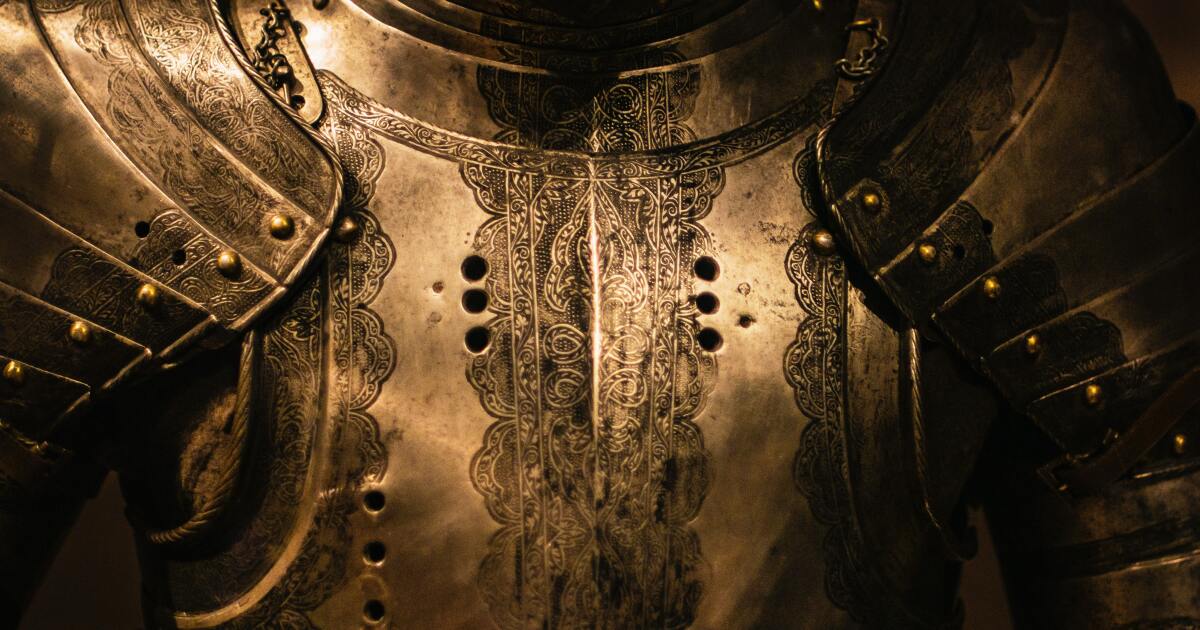
On a recent bitterly cold Sunday afternoon, I armed myself with a cup of cocoa and fluffy throw and rewatched a 2001 movie, billed as a “medieval comedy adventure.” A Knight’s Tale is the improbable story of a young squire who decides to impersonate his royal knight when the knight dies unexpectedly. As the story unfolds, we also meet a young Geoffrey Chaucer who becomes part of the wannabe knight’s entourage and, by the movie’s end, supposedly gets the inspiration for the first of his Canterbury Tales. It’s a fun romp, complete with the rock group Queen’s “We Will Rock You” as part of the score! A wonderful way to spend a winter’s afternoon.
It also got me thinking about music about knights, pre-Queen, that is. Here are a few pieces that come to mind:
English composer Henry Purcell teamed up with librettist John Dryden to create a five-act opera simply titled King Arthur in 1691. While the opera-with-spoken-text is about the King we know from “…and the Knights of the Round Table,” it is not about that phase of Arthur’s life. Purcell’s tale concerns itself with a battle between Arthur’s army and the Saxons who have abducted his fiancé Emmeline. A recording we favor at the station is Thomas Hengelbrock conducting the Freiburg Baroque Orchestra in the “Suite from King Arthur.”
Franz Schubert’s opera, Fierrabras, the Overture of which you can hear on WCRB from time to time, is the story of a Saracen (or, Moorish) knight whose fictional story intertwines with the real Emperor Charlemagne and his court. Both Carl Maria von Weber and Schubert were asked by the major opera house in Vienna to contribute an opera each in an effort to start expanding the genre in the German language. Weber’s came first and got such a poor reception that Schubert’s 1823 contribution was shelved, but the Overture lives on. Here it is with Christian Benda conducting the Prague Sinfonia.
It’s always struck me as curious that Schubert made no attempt to recreate the music of, or even to include a more general nod to, the sounds of the Early Middle Ages, which would have been heard during the time of Charlemagne. Fierrabras sounds like the music of Schubert’s day.
Richard Strauss was so inspired by Miguel de Cervantes’s 1605 novel, The Ingenious Gentleman Don Quixote of La Mancha, that he composed a tone poem about it. Strauss followed the action in the epic novel closely, starting with Don Quixote reading so many books about chivalrous knights that he becomes delusional, believing he is a knight himself. The approximately 45-minute long piece, with a solo cellist inhabiting the title character, has an introduction, main theme, 10 variations that cover the main parts of the story, and a grand finale. Variation No. 10 is entitled “Duel with the knight of the bright moon.” Here is Staatskapelle Dresden, conducted by Rudolf Kempe, featuring cellist Paul Tortelier.
Around 1889 Edward Elgar wrote what he described as a “symphony with chorus and orchestra,” which told the story of The Black Knight in three parts. He envisioned the story where a mysterious knight shows up unexpectedly, defeats members of a particular king’s court in a tournament, and kills the king’s two children. The story never reveals why. It’s an extremely dark tale, but with what was hailed as exceptional music for the time. Sir Charles Groves conducts the Royal Liverpool Philharmonic Orchestra and Chorus in the entire 35-minute piece.
Sergei Prokofiev, who was living in Paris in the 1930s, was lured back to Russia with a commission for a new ballet and a promise that if he’d write it, the Bolshoi would perform it. Romeo and Juliet became one of the composer’s landmark works. And the “Dance of the Knights” shows the knights at the Capulet’s masquerade ball. This is a scene from a Royal Opera House (London) production.
At least two pop artists in recent years have “borrowed” the “Dance of the Knights.” You can hear the music clearly from the start of Sia’s 2000 hit, “Taken for Granted,” and 2016’s “Party Like a Russian” by Robbie Williams.
One of the most rousing scores to a knights-themed movie was composed by Miklós Rózsa for the 1953 movie Knights of the Round Table. I remember watching it on our small TV one Saturday afternoon while sitting next to my dad. He was just a kid himself when he watched it on the silver screen and actually mentioned that Rózsa’s score “made the movie as exciting as could be.” Rózsa himself conducts his orchestra in the Prelude.
Those who bore names like Arthur, Lancelot, Galahad and Don Quixote are long past, but the stories, fiction and nonfiction alike, continue to inspire, as does the music to go along with them.
CODA: Here is Queen’s ”We Will Rock You” in the opening to A Knight’s Tale. It was absolutely genius to pair that music with the jousting scene because you just know that if we still had such jousts today, that would be part of the sporting event!